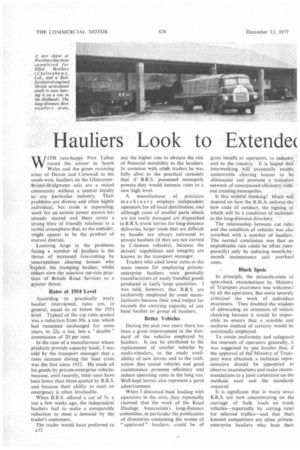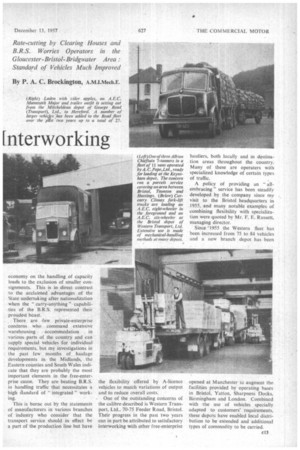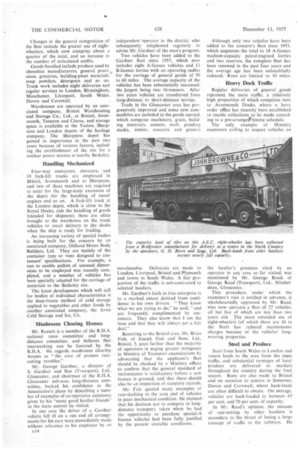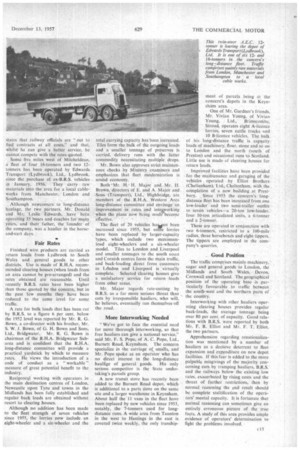Hauliers Look to Extende( [nterworking
Page 54

Page 55

Page 56

Page 57

If you've noticed an error in this article please click here to report it so we can fix it.
Rate-cutting by Clearing Houses and B.R.S. Worries Operators in the Gloucester-Bristol-Bridgwater Area : Standard of Vehicles Much Improved
By P. A. C. Brockington, A.M.I.Mech.E.
WITH rate-happy Port Talbot round the corner in South Wales and the green receiving areas of Devon and Cornwall to the south-west, hauliers on the GloucesterBristol-Bridgwater axis arc a mixed community without a central loyalty to any particular industry. Their problems are diverse arid often highly individual, but trade is expanding, work for an atomic power station has already started and there exists a strong fibre of friendly relations in a turbid atmosphere that, to the outsider, might appear to be the product of mutual distrust.
Looming large in the problems facing a number of hauliers is the threat of increased rate-cutting by unscrupulous clearing houses who
• 4exp.loit the tramping haulier, whilst -others view the selective cut-rate practices of British Road Services as a greater threat.
Rates at 1954 Level
According to practically every haulier interviewed, rates are, in general, equal to or below the 1954 level. Typical of the cut rates quoted was a reduction from 30s. a ton, which had remained unchanged for some years, to 22s. a ton, less a "double " commission of 20 per cent.
In the case of a manufacturer whose Products provide capacity loads, I was told by the transport manager that a rates increase during the Suez crisis was the first since 1952. He sends all his goods by private-enterprise vehicles because, until recently, their rates have been lower than those quoted by B.R.S. and because their ability to meet an emergency is often invaluable.
When B.R.S. offered a cut of 5s. a ton a few weeks ago, the independent hauliers had to make a comparable reduction to meet a demand by the trader's customers.
The trader would have preferred to c 12 pay the higher rate to obviate the risk of financial instability to the hauliers. In common with other traders he was fully alive to the practical certainty that if B.R.S. possessed monopoly powers they would increase rates to a new high level.
A manufacturer of precision machinery employs independent operators for all local distribution, and although cases of smaller parts which are not easily damaged are dispatched in B.R.S. trunk lorries for long-distance deliveries, larger loads that arc difficult to handle are always entrusted to private hauliers (if they are not carried in C-licence vehicles), because the drivers' capabilities and integrity are known to the transport manager.
Traders who cited lower rates as the main reason for employing privateenterprise hauliers were generally manufacturers of easily-handled goods produced in fairly large quantities. was told, however, that B.R.S. are exclusively employed by some manufacturers because their total output far exceeds the carrying capacity of any local haulier or group of hauliers.
Better Vehicles
During the past two years there has been a great improvement in the standard of the vehicles employed by hauliers. It can be attributed to the replacement of smaller vehicles by multi-wheelers, to the ready availability of new lorries and to the realization that sound vehicles and good maintenance promote efficiency and reduce operating costs in the long run. Well-kept lorries also represent a good advertisement.
When I discussed back loading with operators in the area, they repeatedly claimed that the work of the Road Haulage Association's long-distance committee, in particular the publication of directories containing the names of " approved" hauliers, could he of
great benefit to operators, to industry and to the country. It is hoped that • interworking will eventually enable undesirable clearing houses to be eliminated and promote a transport network of unsurpassed efficiency:with
out creating monopolies. .
Is this wishful thinking? Much will depend on how the R.H.A. enforce the 'new code of conduct, the signing of which will be a condition of inclusion in the' long-distance directory.
The relationship between cut rates and the condition of vehicles was also reviewed with a number of hauliers. The normal conclusion was that an unprofitable rate could be offset (temporarily) only by reducing month-bymonth Maintenance and overhaul costs.
Black Spots
In principle, the intensification of spot-check examinations by Ministry of Transport examiners was welcomed by all the operators. But some severely criticized the work of individual examiners. They doubted the wisdom of advocating an extension of vehicle checking because it would be impossible to ensure that a sensible and uniform method of scrutiny would be universally employed.
To create uniformity and safeguard the interests of operators generally, it was suggested by one haulier that, if the approval of the-Ministry of Transport were obtained, a technical representative should be appointed to observe examinations and make recommendations to a joint committee on the methods used and the standards required.
It is significant that in many, areas B.R.S. are now concentrating on the carriage of bulk loads on trunk vehicles—reportedly by cutting rates for selected traffics—and that their keenest competitors are often privateenterprise hauliers who base their economy on the handling of capacity loads to the exclusion of smaller consignments. This is in direct contrast to the acclaimed advantages of the State undertaking after nationalization when the " carry-anything " capabilities of the B.R.S. represented their proudest boast.
There are .few private-enterprise concerns who command extensive warehousing accommodation in various parts of the country and can supply special vehicles for individual requirements, but my investigations in the past few months of haulage developments in. the Midlands, the Eastern counties and South Wales indicate that they are probably the most important elements in the free-enterprise cause. They are beating B.R.S. in handling traffic that necessitates a high Aandard of "integrated" working.
This is borne out by the statements of manufacturers in various branches of industry who consider that the transport service should in effect be a part of the production line but have the flexibility offered by A-licence vehicles to match variations of output and to reduce overall costs.
One of the outstanding concerns of the calibre described is Western Transport, Ltd., 70-75 Feeder Road, Bristol. Their progress in the past two years can in part be attributed to satisfactory interworking with other free-enterprise hauliers, both locally and in destination areas throughout the country; Many of these are operaters with specialized knowledge of certain types of traffic.
A policy of providing an "allembracing" service has been steadily developed by the company since my visit to the Bristol headquarters in 1955, and many notable examples of combining flexibility with specialization were quoted by Mr. F. E. Russett, managing director.
Since .1955 the Western fleet has been increased from 75 to 84 vehicles and a new branch depot has been
opened at Manchester to augment the facilities provided by operating bases in Bristol, Yatton, Sharpness Docks, Birmingham and London. Combined with the use of vehicles specially adapted to customers' requirements, these dep(A; have enabled local distribution to be extended and additional types of commodity to be carried.
Changes in the general composition of the fleet include the greater use of eightwheelers, which now comprise about a quarter of the total, and an increase in the number of articulated outfits.
Goods handled include produce used by chocolate manufacturers, general provisions, groceries, building-plant materials. soap powders, detergents and so on. Trunk work includes night deliveries and regular services to London, Birmingham, Manchester, Liverpool, South Wales. Devon and Cornwall.
Warehouses are operated by an associated company, Bristol Warehousing and Storage Co., Ltd., at Bristol, Avonmouth, Taunton and Cleeve, and storage space is available at the Yatton, Sharpness and London depots of the haulage company. The Sharpness depot has gained in importance in the past two years because of various factors, including the establishment of the site for a nuclear power station at nearby Berkeley.
Handling Mechanized
Four-way conveyors, elevators, and 10 fork-lift trucks are employed in Bristol, Avonmouth and at Sharpness. and two of these machines are required to cater for the large-scale extension of the depot for the handling of cased engines and so on. A fork-lift truck at the London depot, which is close to the Royal Docks, aids the handling of goods intended for shipment; these are often brought to the warehouse on the trunk vehicles to await delivery to the docks when the ship is ready for loading.
An increasing variety of special bodies is being built for the concern by an associated company, Oldland Motor Body Builders, Ltd. They are mainly of the container type or vans designed to customers' specifications. For example, a van to enable pallets of unusual dimensions to be employed was recently completed, and a number of vehicles has been specially adapted for the carriage of materials to the Berkeley site.
The latest development which will call for bodies of individual characteristics is the deep-freeze method of cold storage applied to vegetables and other foods by another associated company. the Avon Cold Storage and Ice, Co.
Mushroom Clearing Houses
Mr. Russell is a member of the R.H.A. national rates committee and longdistance committee, and believes that interworking can be fostered by the R.H.A. He regards mushroom clearing houses as " the core of present ratecutting troubles."
Mr. George Gardner, a director of S. Gardner and Son (Transport). Ltd.. Gloucester. and chairman of the R.H.A. Gloucester sub-area long-distance committee, backed his confidence in the Association's plans by describing a number of examples of co-operative assistance given by his "many good haulier friends" in the main centres he visited.
In onc case the driver of a Gardner vehicle fell ill on a run and all arrangements for his care were immediately made without reference to his employer by an c14 independent operator in the district, who subsequently telephoned regularly to advise Mr. Gardner of the man's progress.
Two vehicles have been added to the Gardner fleet since 1955, which now includes eight A-licence vehicles and 13 B-licence lorries with an operating radius for the carriage of general goods of 50 to 60 miles. The average capacity of the vehicles has been substantially increased, the largest being two 16-tonners. After two years vehicles are transferred from long-distance to short-distance service.
Trade in the Gloucester area has progressively improved and some new commodities are included in the goods carried, which comprise machinery, grain, building materials, cement, malt, grinding media, timber, concrete and general merchandise. Deliveries are made to London, Liverpool, Bristol and Plymouth and towns in South Wales_ A fair proportion of the traffic is sub-contracted to selected hauliers.
Mr. Gardher's faith in free enterprise is to a marked extent derived from confidence in his own drivers. "They know what we arc trying to do," he said, "and are frequently complimented by customers. They also know that I am the boss and that they will always get a fair deal."
Reverting to the Bristol area. Mr. Brian Fish, of Joseph Fish and Sons. Ltd., Bristol, 5, goes further than the majority of operators in urging greater stringency in Ministry of Transport examinations by advocating that the applicant's fleet should be checked by a Ministry officer to confirm that the general standard of maintenance is satisfactory before a new licence is granted, and that there should also be an inspection of statutory records.
Mr. Fish quoted many examples of rate-slashing in the area and of vehicles in poor mechanical condition. He claimed that his decision not to compete in longdistance transport, taken when he had the opportunity to purchase special-A licence vehicles had been fully justified by the present unstable conditions. Although only two vehicles have been added to the concern's fleet since 1955. which augments the total to 18 A-licence medium-capacity petrol-engined lorries and two reserves, the complete fleet has been renewed in the past four years and the average age has been substantially reduced. Runs arc limited to 30 miles.
Heavy Dock Traffic
Regular deliveries of general ,goods represent the main traffic, a relatively high proportion of which comprises runs to Avonmouth Docks, where a lorry order office has recently been established to enable collections to be made according to a pre-arrangetPtiming schedule.
The only example of Ministry examiners calling to inspect vehicles on the haulier's premises cited by an operator in any area so far visited, was mentioned by Mr. George Read, of George Read (Transport), Ltd.. Mitcheldean. Gloucester.
This procedure, 'under which the examiner's visit is notified in advance, is wholeheartedly approved by Mr. Read, who now operates a fleet of 27 vehicles, all but five of which are less -than two years old. The more extended use of eight-wheeler's (of which there are 16 in the fleet) has reduced maintenance charges because of the vehicles' longwearing properties.
Steel and Produce
Steel from South Wales to London and return loads to the area form the main traffic. and substantial tonnages of local produce are delivered to markets throughout the country during the fruit season. Runs are also made to Bristol and on occasion to centres in Somerset, Devon and Cornwall, where back-loads are often difficult to obtain. On average. vehicles are back-loaded to between 65 per cent. and 70 per cent, of capacity.
In Mr. Read's opinion, the menace of rate-cutting by other hauliers is secondary to the threat of losing a large tonnage of traffic to the railways. He states that railway officials are "out to find contracts at all costs," and that, whilst he can give a better service, he cannot compete with the rates quoted.
Some five miles west of Mitcheldean. a fleet of four 16-tonners and two 12tonners has been operated by Edwards Transport (Lydbrook), Ltd., Lydbrook, since the purchase of ex-B.R.S. vehicles in January. 1956. They carry raw materials into the area for a local cableworks from Manchester, London and Southampton.
Although newcomers to long-distance haulage, the two partners, Mr. Donald and Mr. Leslie Edwards, have been operatine 35 buses and coaches for many. years. and their father, the founder of the company, was a haulier in the horseand-cart days.
Fair Rates Finished wire products are carried as return loads from Lydbrook to South Wales and general goods to other districts. Use is made of R.H.A. recommended clearing houses (when loads from an area cannot be pre-arranged) and the rates obtained are reasonable. Until recently B.R.S. rates have been higher than those quoted by the concern, but in the past few months they have been reduced to the same level for some traffic.
A rate for bulk loads that has been cut by B.R.S. to a figure 6 per cent, below the 1952 level was reported by Mr. R. G. Bown. a co-director with his brother, Mr. S. W. J. Bown, of G. H. Bown and Sons, Ltd., Bridgwater. Mr. R. G. Bown is chairman of the R.H.A. Bridgwater Subarea and is confident that the R.H.A. long-distance committee will provide a practical yardstick by which to measure rates. He views the introduction of a code of conduct as a " workable " measure of great potential benefit to the industry.
Reciprocal working with operators in the main destination centres of London, Newcastle upon Tyne and towns in the Midlands has been fully established and regular back loads are obtained without resort to clearing houses.
Although no addition has been made to the fleet strength of seven vehicles since 1955, the lorries now include an eight-wheeler and a six-wheeler and the total carrying capacity has been increased. Tiles form the bulk of the outgoing loads and a smaller tonnage of preserves is carried, delivery runs with the latter commodity necessitating multiple drops.
Mr. Bown also approves strict maintenance checks by Ministry examiners and emphasizes that fleet modernization is sound -economy.
Both -Mr. H.' H. Major and Mr. H. Brown, directors of E. and A. Major and Sons (Transport), Ltd.. Highbridge, are members of the R.H.A. Western Area long-distance committee and envisage an improvement in rates and inteavorking when the plans now being madnecome effective. '
The 'fleet of 20 vehicles hawot been increased since 1955, but soffe lorries have been replaced by larger-capacity 'types, which include two maximumload eight-wheelers and a six-wheeler model. Tiles to London and Liverpool and smaller tonnages to the south coast and Cornish centres form the main traffic, and back-loading direct from customers in Ldndon and Liverpool is virtua!ly complete. Selected clearing houses give a satisfactory service for return loads from other areas.
Mr. Major regards rate-cutting by B.R.S. as a far more serious threat than cuts by irresponsible hauliers, who will, he believes, eventually run themselves' off the road.
More Interworking Needed "We've got to face the essential need for more thorough interworking, so that free hauliers can give a national service," said Mr. F. S. Pope, of A. C. Pope, Ltd., Burnett Road, Keynsham. The concern specialize in the carriage of smalls, and Mr. Pope spoke as an operator who has no direct interest in the long-distance haulage of general goods. His only serious competitor is the State undertaking's parcels group.
A new transit store has recently been added to the Burnett Road depot, which is additional to a parts store on the same site and a larger warehouse in Keynsham. About half the 11 vans in the fleet have been replaced by new vehicles since 1955, notably, the 7-tonners used for longdistance runs. A wide area from Taunton in the west to Hastings in the east is covered twice weekly, the only tranship rnent of parcels being at the concern's depots in the Keynsham area.
One of Mr. Gardner's friends, Mr. Vivian Young, of Vivian Young, Ltd., Brimscombc, Stroud. operates eight A-licence lorries, seven cattle trucks and 10 B-licence vehicles. The bulk of his long-distance traffic is capacity loads of machinery, flour, stone and so on to London and the north (south of Preston) and occasional runs to Scotland. Little use is made of clearing houses for return loads.
Improved facilities have been provided for the maintenance and garaging of the vehicles operated by Elliot Brothers (Chelienham), Ltd., Cheltenham, with the completion of a new building at Prestbury. Since 1955 the concern's longdistance fleet has been increased from one low-loader and two semi-trailer outfits to seven vehicles—a. 20-ton low-loader. four 10-ton articulated units, a 6-tonner and a 2-tonner.
These are operated in-conjunction with two 6-tonners, restricted to a 100-mile radius, three horseboxes and eight tippers. The tippers are employed in the company's quarries.
. Good Position •
The traffic comprises mainly machinery, sugar and general goods to London, the Midlands and South Wales, Devon. Cornwall and Scotland. The geographical position of the operating base is particularly favourable Co traffic between the south-west and the northern parts of the country.
Interworking with other hauliers operating clearing houses provides regular back-loads, the average tonnage being over 80 per cent, of capacity. Good relations with B.R.S. were reported by both Mr. F. R. Elliot and Mr. F. T. Elliot. the two partners.
Apprehension regarding renationalization was mentioned by a number of hauliers as a decisive deterrent to fleet expansion and expenditure on new depot facilities. If this fear is added to the more palpable misgivings of the majority concerning cuts by tramping hauliers, B.R.S. and the railways below the existing low rates, exacerbated by rising costs and the threat of further restrictions, then by normal reasoning the end result should be complete stultification of the operators' mental capacity. It is fortunate that normal reasoning can sometimes give an entirely erroneous picture of the true facts. A study of this area provides ample evidence of operators' determination to fight the problems involved.




















































































































